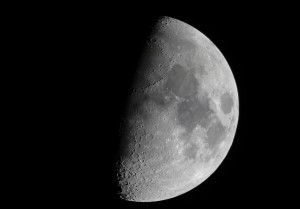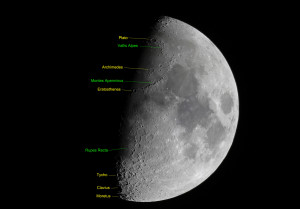
La Luna en cuarto creciente el día el equinoccio de primavera. Aquella tarde salimos a fotografiar el cometa Panstarrs y una hermosa Luna nos acompañó en la observación. Al final no pudimos resistirnos a apuntarla con nuestros telescopios y nos encantó observar los cráteres Plato, Tycho y especialmente Moretus, el cual quedaba totalmente a oscuras a excepción de su pico central, que brillaba iluminado por los rayos del Sol.
Rupes Recta parecía estar fuera de lugar, como una línea negra artificial pintada sobre la superficie lunar y los Montes Apenninus resaltaban majestuosos sobre la superficie de nuestro satélite, proyectando sus sombras y dándonos idea de la altitud de los picos principales.
TELESCOPIO / TELESCOPE: Celestron Newton 150/750
CÁMARA / CAMERA: Canon EOS 1000D
ACCESORIOS / ACCESSORIES:
AUTOGUIADO / AUTOGUIDE:
EXP: 1 frame 1/160 ISO 100
MALE: 3/5
SEEING: 4/5
FECHA Y LUGAR / PLACE AND DATE: 20 de marzo de 2013, Torrejón de la Calzada
PROCESADO / PROCESSING: Photoshop
The crescent Moon on the spring equinox. That afternoon we went to photograph the Panstarrs comet and a beautiful moon accompanied us on our observation. At the end we could not resist pointing it with our telescopes and observe craters like Plato, Tycho and especially Moretus, which was completely dark except for its central peak, illuminated by the Sun.
Rupes Recta seemed out of place, like an artificial black line painted on the lunar surface and Apenninus stood majestic mountains on the surface of the moon, casting its shadows and giving idea of the height of the main peaks.
